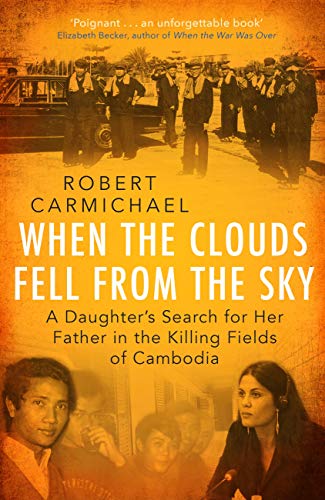What do you think?
Rate this book


'Like Auschwitz, like Stalin's purges, the mass murders of the Khmer Rouge are one of those extraordinary events that make us wonder about the human capacity for evil. Through a profoundly moving tale that weaves together the connected stories of a victim, his surviving family, and members of the regime, Robert Carmichael brings us into the heart of the darkness that took over Cambodia, bringing it alive in the way no mere statistics can. I've not seen a comparable book about these horrors.'
Adam Hochschild, award-winning author of
King Leopold's Ghost
'What does it mean to say two million people lost their lives during the years of Khmer Rouge rule? The true answer can only be told in microcosm, as Robert Carmichael has done in this intimate and heartbreaking story of the disappearance of one man, and the decades of suffering that followed as his family searched for answers.'
Seth Mydans, former Southeast Asia correspondent for the New York Times
'As moving as it is well researched. Robert Carmichael's sharp prose and depth of knowledge of Cambodia's history transforms a daughter's search for her missing father into a nation's journey to find peace and reconciliation with its brutal history of genocide.'
Loung Ung, author of First They Killed My Father
'To keep you is no benefit, to destroy you is no loss.'
During the Khmer Rouge's four-year rule of terror, two million people, or one in every four, Cambodians, died. In describing one family's decades-long quest to learn their husband's and father's fate and the war crimes trial of Comrade Duch (pronounced 'Doyk'), who ran the notorious S-21 prison in Phnom Penh, When the Clouds Fell from the Sky illuminates the tragedy of a nation.
In 2012, Duch was sentenced to life imprisonment, having been found responsible for the deaths of more than 12,000 people. He was the first Khmer Rouge member to be jailed for crimes committed during Pol Pot's catastrophic 1975-9 rule during which millions were executed or died from starvation, illness and overwork as Cambodia underwent the most radical social transformation ever attempted. Designed to outdo even Mao's Great Leap Forward, it was an unparalleled disaster.
At the same time, the Khmer Rouge closed Cambodia's borders, barred all communication with the outside world and sought to turn the clock back to Year Zero. They outlawed religion, markets, money, education and even the concept of family.
The revolution soon imploded, driven to destruction by the incompetence and paranoia of the leadership. Yet instead of recognising their own failings, the leaders sought unseen enemies everywhere. In their pursuit of purity, they destroyed a nation.
Like hundreds of other returnees, when he returned in 1977 Ouk Ket was utterly unaware of the terrors being wrought in the revolution's name. Hundreds of thousands of other Cambodians perished in nearly 200 institutions like S-21.
To illustrate this era and its consequences, Robert Carmichael has woven together the stories of five people whose lives intersected to traumatic effect: Duch; Ket's daughter, Neary, who was just two when her father disappeared; Ouk Ket himself; Ket's French wife, Martine; and Ket's cousin, Sady, who never left Cambodia and still lives there today.
Through these personal stories, the author's own research, numerous interviews and months spent following Duch's trial, Robert extrapolates from the experience of one man to tell the story of a nation.
368 pages, Kindle Edition
First published April 10, 2015
“A single death is a tragedy. A million deaths is a statistic” Though the origin of this quote is murky, it illustrates the truth that the sheer numbers involved in the mass murders and genocides of the 20th Century can so overwhelm the mind that the human cost of these horrific crimes gets lost. This is certainly true of the over two million murders that Pol Pot and his cadres committed in Cambodia during the period from 1975 to 1979. When Clouds Fell From The Sky by author Robert Carmichael reveals the human tragedy in the statistics by telling the story of what happened in Cambodia through the stories of several individuals who lived through this dark chapter in history, mostly victims, but a perpetrator as well.
The story of Neary’s decades-long search for her missing father, Ket, is one of the most compelling in the book and contrasts well with the career and eventual trial of Duch, one of those most responsible for the torture and murder of innocent people under the Democratic Kampuchea regime. The author deftly weaves these two narratives with several others in the book to demonstrate the humanity of those massacred by bringing their individuality into focus. Vignettes of family life before the terror in Neary’s extended family flesh out the devastating effects of the Khmer Rouge’s radical Maoist program after the guerilla group took control of the nation in April 1975. Too, through the story of Duch, head of the infamous S-21 torture center, we see an up-close portrait of a mass murderer, who carried out the Khmer Rouge regime’s increasingly paranoid orders by extracting confessions from thousands, including denounced Communist Party of Kampuchea members, before sending them to be murdered at a nearby killing field.
When Clouds Fell From The Sky is essential reading for anyone who wants to comprehend the history of modern-day Cambodia. Unlike many of the academic treatments of this period, it is accessible and demonstrates the fundamental resilience of the Cambodian people, a resilience that continues to the present day.